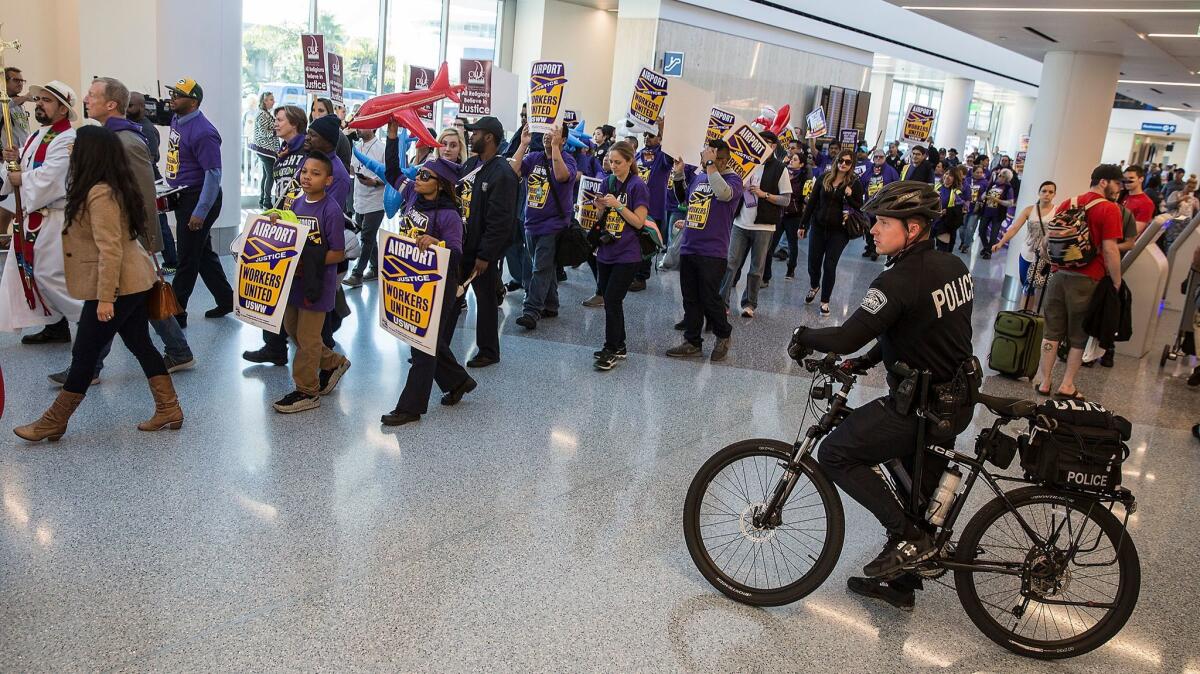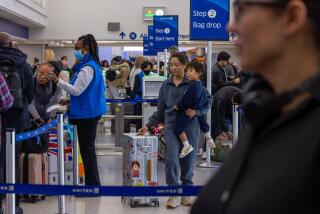Labor prepares to defend its victories on higher wages and worker rights

In a scene reminiscent of old-fashioned labor activism, workers and their supporters marched Tuesday through Los Angeles International Airport and in airports and restaurants across the U.S., demanding higher pay and union representation for low-wage workers.
The protests were peaceful, but they may just be a prelude of battles to come, as unions face a new administration in Washington and efforts to roll back labor victories.
In recent years, California and other states and cities have increased their minimum wages. A federal ruling put employers on the hook for labor violations, even if they used workers hired by another business. And another federal ruling sped up the union election process.
But labor economists say that under the Trump administration, and a Republican-controlled Congress, some of these issues, as well as unionization in general, could be curtailed.
“There’s a whole set of areas where I think we’ll have to expect rollbacks,” said Chris Tilly, an economist and professor of urban planning at UCLA and former director of the university’s Institute for Research on Labor and Employment. “Labor will hope the Democrats fight for some of these things, but some of them are very much under the discretion of the administration and their appointees.”
One of these is the makeup of the National Labor Relations Board, the five-member, quasi-judicial federal agency that enforces employees’ rights to organize or dissolve unions, and also makes decisions in cases involving unfair labor practices in the private sector.

In a scene reminiscent of old-fashioned labor activism, workers and their supporters march Tuesday through Los Angeles International Airport and in restaurants across the U.S., demanding higher pay and union representation for low-wage workers.
Immediately upon entering office, Trump will be able to fill two vacancies on the board. Another spot will open up in 2017, when board member Philip Miscimarra’s term expires. The last two members’ terms expire in 2018 and 2019.
The board currently has a liberal majority, but labor experts expect that to change with the new Trump appointees.
That move could change key decisions the board made during the Obama administration, such as its ruling in 2015 that loosened the definition of a joint employer to include companies that use staffing agencies, contractors or even fast-food franchises, or its decision that graduate students who help teach or do research at private universities are employees and have union representation rights.
“It’s quite likely, with conservative appointees to the board, that we could see ... reversals in a number of areas, which could mean further obstacles to unions organizing through the law,” said Ken Jacobs, chairman of the UC Berkeley Labor Center.
Trump’s new appointee to the Supreme Court could also have implications for public unions. In March, the justices deadlocked on a lawsuit that would have struck down mandatory “fair share fees” that cover the cost of collective bargaining for municipal employees, transit workers, teachers and college instructors in California and 22 other mostly Democratic states. These fees are prohibited in Southern states and some in the Rust Belt that have “right to work” laws.
The Supreme Court tie kept the mandatory fees in place -- for now.
“The practical effect has got to be to weaken unions considerably, and to force them to pile a lot of resources into retaining membership,” said Tilly of UCLA. “That would be a very serious obstacle to any attempts by labor to maintain its power and flex its muscles.”
One issue unlikely to lose steam is the effort to boost the minimum wage.
This has been a long-standing issue for conservative groups, which say boosting the minimum wage could force small businesses to shutter or cut worker hours.
But labor experts say an increase in the minimum wage has proven to be a popular issue with voters of all political parties.
Though Arizona voted for Trump on election day, it joined Colorado, Maine, and Washington in passing referendums to increase the minimum wage. Earlier this year, California and New York passed laws to gradually boost the states’ minimum wage to $15 an hour.
And in 2015, the Los Angeles City Council and the L.A. County Board of Supervisors approved a law to increase the minimum wage to $15 an hour by 2020.
“Where we’ve seen most of the action in recent years is at the state and local level, and I expect that to continue,” Jacobs said.
“The Fight for $15 has really brought that issue out into the public eye in a very effective way and changed people’s understandings of what’s needed and people’s sense of what’s possible,” he said.
The nationwide “day of disruption” protests held Tuesday marked the fourth anniversary of a New York City fast-food workers strike that launched the fight for a $15-an-hour minimum wage. A major backer of the campaign, and the latest protests, is the Service Employees International Union.
In Los Angeles, about 40 people were arrested after refusing the LAPD’s call to disperse from an intersection near downtown Los Angeles. They were among a larger peaceful demonstration of more than 200 people outside a McDonald’s at East 7th and Alameda streets.
Later that day, about 600 people marched through LAX and surrounding streets.
The group, which included airport workers as well as child-care, healthcare and fast-food workers, met in front of the airport around noon at Century and Sepulveda boulevards before marching through the airport and into some of the terminals.
The demonstration lasted about an hour and police said no arrests were made. LAX officials said no service was disrupted, though traffic slowed in front of some terminals.
Trump’s plans to cut taxes sharply for those with high incomes could make the issue of raising the lowest wage “more powerful and compelling,” said William Gould IV, a professor emeritus at Stanford Law School, current chairman of the California Agricultural Labor Relations Board and a former chairman of the NLRB.
“In an era of inequality, it seems to me that will provide more fuel to organizations representing low-income people,” he said.
Kendall Fells, the national organizing director of the Fight for $15 campaign, said the coalition has seen “exponential growth” in the last couple of months, and that there is a “renewed sense of urgency because of the election.” He emphasized that the group would have protested, regardless of who won the election.
“Even within all of the constraints … I think there will continue to be efforts by unions to continue to organize,” Jacobs said. “People will continue to look for and find ways to organize and express their collective power.”
Times staff photographer Brian van der Brug and Times staff writer Natalie Kitroeff contributed to this report.
For more business news, follow me @smasunaga
UPDATES:
5:05 p.m.: This article was updated throughout with analysis from labor economists.
2:05 p.m.: This article was updated with details about the noon protest at Los Angeles International Airport.
This article was originally published at 9:10 a.m.
More to Read
Inside the business of entertainment
The Wide Shot brings you news, analysis and insights on everything from streaming wars to production — and what it all means for the future.
You may occasionally receive promotional content from the Los Angeles Times.











